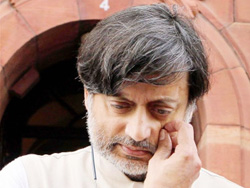Guruvayur, Jan 9: Expressing concern over the way investigation was being done into the death of his wife Sunanda Pushkar, Congress MP Shashi Tharoor today demanded a professional police probe without any political pressure or consideration and pre-determined outcome.
He also offered to face questioning by Delhi Police at an early opportunity to address the questions they may have.
Days after the Delhi Police filed a case of murder in his wife's mysterious death almost a year ago, the former Union Minister, who completed a two-week Ayurveda treatment near here, met the media to say that he will extend full cooperation in a "fair" investigation.
"I have a number of questions in my mind and concerns over the way in which the investigation had moved so far. I have written to the Police Commissioner yesterday in detail. Hope he will have discussions with the investigating officers. It is for him to do what he wants to do," he said.
In his letter to the Police Commissioner, Tharoor said he is looking for an early opportunity to address questions "his people may have".
"It is very important that it (probe) should be done professionally without any political pressure or intervention and without any pre-determined outcome," he said.
Tharoor again said that he was "taken aback" by the police decision to register a murder case as the family had no reason to believe "foul play" in Sunanda's death.
"I was completely taken aback as there is no reason to believe for any one in the family that foul play would have been involved in her passing away. Every one loved her and (there was) no question of any one having reason to harm (Sunanda)," he said.
"There was no reason for anyone who had access to her would do anything to do her any harm. But I pledge full cooperation in the investigation," he said.
"Let the police do their job. We all would like to see the matter closed and justice is done to all including Sunanda," 58-year-old Tharoor, who represents Thiruvananthapuram in Lok Sabha, said.
Tharoor said many of the things coming in connection with the case were "unnecessary controversy, disinformation and sometimes outright lies".
"I have been suffering for the last one year. We will like to have this procedure to get justice to all starting with her (Sunanda), family members and myself as husband.
"I lost my wife. I am not allowed to mourn for more than an year. I have gone through a great deal of pain," he said.
Dismissing criticism that he has maintained a "sinister silence" after the fresh FIR was lodged in the case, Tharoor said, "I have been silent on this for one year as the police investigation is on. The reason is very simple. Obviously when there is a police inquiry on it is my duty not to undermine or compromise the investigation any way."
He voiced anguish over "unnecessary public controversy" and "distortion" in media reportage.
Tharoor refused to take questions saying he is not going to engage in public discussion over a very personal tragedy and asked media to have some "soul and heart" and some "human decency:" while reporting on such personal tragedies.






Comments
Add new comment